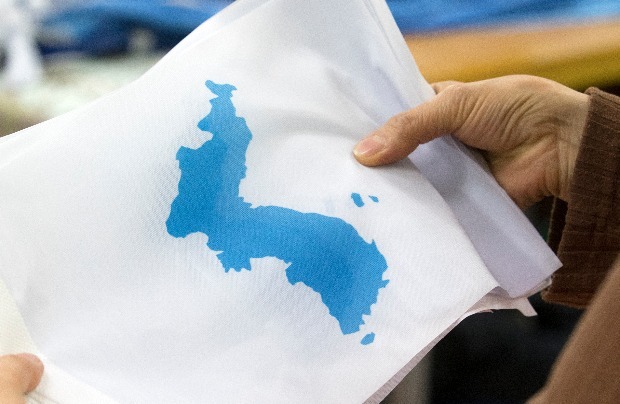A South Korean activist said he had emailed a complaint to the members of the International Olympic Committee about its recommendation not to include the eastern islets of Dokdo on a flag for the two Koreas to use together at international sporting events.
The original mock-up of the Korean Unification Flag, which features a blue Korean Peninsula against a white background, included the disputed rocky islets in the East Sea. But Seoul decided to amend the image, using an alternative for the PyeongChang Winter Olympics in February, after the committee suggested that Korea not politicize the sports event -- a recommendation handed down after Japan expressed concerns over the image.
 |
(Yonhap) |
Seo Kyung-duk, a professor at Sungshin Women’s University in Seoul, said he believes the committee and the Olympic Council of Asia made the recommendation because Japan has succeeded in making Dokdo the object of a territorial dispute.
Seo said on Tuesday that he had asked the members of both bodies, which collectively represent 206 countries, not to be “deceived” by Japan’s efforts to distort history in its territorial claims over Dokdo.
Seo also sent a video clip, which can be seen on YouTube, to both bodies, providing evidence that Dokdo is Korean territory geographically, historically and legally under international law.
A team of athletes from South and North Korea, competing simply as “Korea,” won a gold medal in the women’s canoeing TBR 500-meter competition on Sunday at the Asian Games in Jakarta-Palembang.
It was the first gold medal for a unified Korean team at any major sporting event, and the athletes hoisted a flag at the medal-awarding ceremony that symbolized unification but did not bear the image of Dokdo.
“If things like this keep happening, Japan will continue to claim at other international events that this is something approved by the (International Olympic Committee) and the (Olympic Council of Asia),” Seo said.
“The Ministry of Culture, Sports and Tourism and the Korean Sport and Olympic Committee must take stronger approaches on this issue, and nongovernmental organizations should work in step (with them) to make our position loud and clear to the international community.”
The video details the history of Dokdo in English, citing geographical records from Korea’s Goryeo and Joseon kingdoms. It also cites 17th-century historical records from Japan’s Interior Ministry stating that neither Ulleungdo nor Dokdo had anything to do with Japan, in response to a request by Shimane Prefecture to claim it as Japanese territory.
By Kim So-hyun (
sophie@heraldcorp.com)



![[Herald Interview] 'Trump will use tariffs as first line of defense for American manufacturing'](http://res.heraldm.com/phpwas/restmb_idxmake.php?idx=644&simg=/content/image/2024/11/26/20241126050017_0.jpg)




